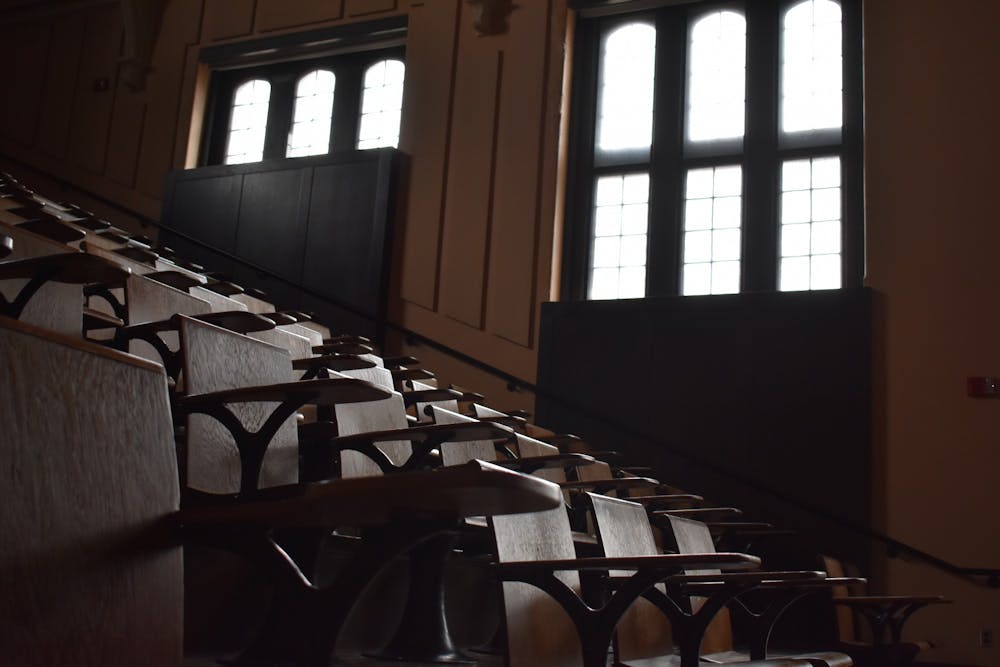Spring of 2022 was a semester of loosening restrictions: The University-wide mask mandate was lifted and classes were held in person. As the semester kicked off, students “signed a petition requesting remote options for teaching and learning throughout the full spring semester.”
To address these students’ concerns, Dean of the College Jill Dolan, along with Vice Provost for Academic Affairs Cole Crittenden and Dean of the Faculty Gene Jarrett ’97 wrote a guest contribution to the ‘Prince’ that emphasized the school’s commitment to in-person courses. In a response, The Daily Princetonian Editorial Board called for the preservation of virtual options to accommodate immunocompromised students.
Nearly a year has passed, and in the time since, it has become clear that virtual class options are required not only for immunocompromised students, or in the heat of pandemic. Princeton ought to keep virtual learning accommodations around for students who have gotten sick, regardless of the illness’ nature, or are otherwise unable to attend class.
While the COVID-19 pandemic is decidedly not over — on campus, positive cases average around 35 per week — the University seems to have come to the same conclusion as President Joe Biden, who announced in September that while “we still have a problem with COVID … the pandemic is over.”
Since the start of this semester, Princeton has further loosened restrictions. Students are now unable to access Zoom lectures, seminars, or recordings, which has become a serious source of inconvenience for students throughout the semester.
While Princeton no longer requires students to submit test samples on a weekly basis, students who choose to self-test and receive a positive result are still required to isolate for a minimum of five days. These students are no longer guaranteed accommodation by the administration and very well might have no way to listen in on Zoom or watch recorded lectures while they are mandated by the University to skip class.
Professors are no longer required to provide accommodations for sick students. In fact, as Columnist Ndeye Thioubou recently wrote about her experience in COVID-19 isolation, “faculty members and preceptors have been discouraged from holding virtual Zoom rooms during class.”
If the isolation policy has not changed for students, why has the Zoom accommodation policy changed? Being sick in isolation is already annoying and painful enough, but having to miss lectures with few resources to catch up on the material can be devastating in Princeton’s fast-paced environment. The burden of catching up on work remains for the students, while the responsibility for professors to support sick students has been lifted.
Students are penalized for their absences, but they can’t help being sick.
Indeed, because of the unavailability of Zoom lectures and recordings, students have a lot to lose. Jenny Jiang ’25, who fell sick late September, told me about how difficult it was for her to request Zoom options for her classes. Due to the lack of resources provided, Jiang had to drop a problem set that week.
Zoom lectures and recordings should not be viewed as a short-term accommodation for students in COVID-19 isolation and instead should be implemented permanently; they do not solely benefit our community during COVID. For example, there are students who get sick due to the flu or other illnesses that render them unable to go to in-person lectures both for their own health and to keep others safe.
Another group of students who will strongly benefit from having Zoom recordings are those who are actively recruiting, as interviews and superday on-sites tend to take place during weekdays from 9 a.m. to 5 p.m., unavoidably clashing with class time. These interviews demand significant time and energy from students, who often come back from these events tired with lots of school work to do.

A junior who wishes to remain anonymous recently flew to Chicago to attend a superday noted that “a lot of interviews require you to block out 3–6 hours of your time, most of the time it requires you to miss classes so it would be really helpful if professors are able to support your career ambitions by simply providing access to Zoom lectures.”
Understandably, some may argue that offering the Zoom accommodations could discourage students from attending lectures in-person, but this could be easily circumvented by only sending the Zoom link or recording to specific students who request it.
Thankfully, there are still some classes that offer online zoom lectures and recordings. For example, ECO362, among other courses, have retained the practice of allowing students to watch the recordings after lecture and welcoming those in COVID-19 isolation to attend live Zoom lectures. This has been very helpful for me. But plenty of other classes do not offer these opportunities.
The University administration should work to universally bring back Zoom lectures and recordings for the benefit of enhanced learning, rather than leaving it up to professors alone.
Kelsey Ji is a junior from Cambridge, Massachusetts majoring in Operations Research and Financial Engineering. She has in fact missed lectures due to interviews and can be reached at xingej@princeton.edu.








